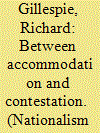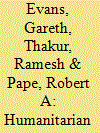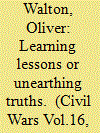| Srl | Item |
| 1 |
ID:
137430


|
|
|
|
|
| Summary/Abstract |
The recent emphasis placed by several mainstream nationalist parties in Europe on sovereignty objectives invites analysis of the drivers behind this phenomenon. Their evolution is characterized by a complex set of dynamics that influences their options when faced with strategic decisions over participation in an existing state and/or challenging it by pressing for statehood. Spain constitutes a major laboratory for studying such dynamics owing to a diverse range of nationally- oriented parties. The experiences of the Basque Country and Catalonia show the continued relevance of center-periphery cleavages, especially when aggravated by European and global pressures and constraints, but party positioning between accommodation and sovereignty politics is influenced too by changing relationships between Basque and Catalan nationalist elites and civil societies and between mainstream nationalist parties and their direct competitors within party systems.
|
|
|
|
|
|
|
|
|
|
|
|
|
|
|
|
| 2 |
ID:
120049


|
|
|
| 3 |
ID:
119448


|
|
|
|
|
| Publication |
2013.
|
| Summary/Abstract |
Assessing the long-term fallout from the 2003 Iraq War from three perspectives - the state, regional and international - this article argues that the war generated a series of changes that have had a central impact on the political evolution and international relations of the Middle East, though not in the manner anticipated by either its supporters or critics.
The war and its consequences, which have become merged with developments surrounding the Arab Spring uprisings, which started at the end of 2010, have contributed over the long term to the acceleration of popular demands for the greater liberalization of politics, to shifts in the regional balance of power and to international realignments. Authoritarian regimes across the region have been increasingly challenged; there are new sectarian divides; Iran has been empowered by the demise of its old rival Saddam Hussein; new 'pivotal' states like Saudi Arabia and Turkey have emerged; and western powers have had to review their policy prescriptions and assumptions of regional predominance.
The new regional order is both fragile and contested. Taking a long view of the Iraq War on its tenth anniversary is important and relevant to understanding contemporary developments in the region - whether in Syria or elsewhere - and serves to highlight patterns of continuity as well as change. Given the continuing violence and bloodshed in Iraq itself, it also offers some important lessons to regional and external powers about the perils of intervention.
|
|
|
|
|
|
|
|
|
|
|
|
|
|
|
|
| 4 |
ID:
131761


|
|
|
|
|
| Publication |
2014.
|
| Summary/Abstract |
This article assesses the potential for evidence-informed policymaking in the field of mediation. It argues that one of the key barriers to evidence-informed policymaking in this area is the disjointed character of the existing literature and finds that methodological and theoretical tensions lie at the heart of policy debates around mediation. While differences in theoretical, epistemological and normative perspectives of the existing research have made it difficult for policymakers to draw clear conclusions from the available evidence, the article nevertheless identifies a degree of convergence around certain key themes such as the importance of legitimacy in determining conflict outcomes and the benefits of combining quantitative and qualitative methods. It concludes by highlighting the importance of policy experimentation, evaluation and building capacity for policy learning in mediation policymaking.
|
|
|
|
|
|
|
|
|
|
|
|
|
|
|
|
| 5 |
ID:
131419


|
|
|
|
|
| Publication |
2014.
|
| Summary/Abstract |
The rise of think-tanks in the United States, in Europe and around the world has generated considerable scholarly attention in recent years. Much of this interest has been fuelled by the widespread belief that these institutions have come to play an increasingly influential role in shaping both public opinion and the domestic and foreign policy preferences and choices of high-level decision-makers. This perception was reinforced when several think-tanks with close ties to the administrations of President George W. Bush and Prime Minister Tony Blair advocated a far more muscular posture towards Iraq in the months and years following the events of 9/1ya. As think-tanks on both sides of the Atlantic continue their efforts to become more entrenched in the policy-making process, scholars are beginning to pay closer attention to how these institutions, established ostensibly to engage in policy research, have become even more adept at political advocacy. Not surprisingly, as think-tanks have devoted more resources to affecting policy change, speculation about how much or little influence they wield has become more intense. The purpose of this article is to explore the evolution and transformation of foreign affairs think-tanks in North America and Europe since the late nineteenth and early twentieth centuries and to highlight, by relying on specific foreign and defence policy issues, the extent to which a handful of think-tanks have been able to become important fixtures in the policy-making community.
|
|
|
|
|
|
|
|
|
|
|
|
|
|
|
|